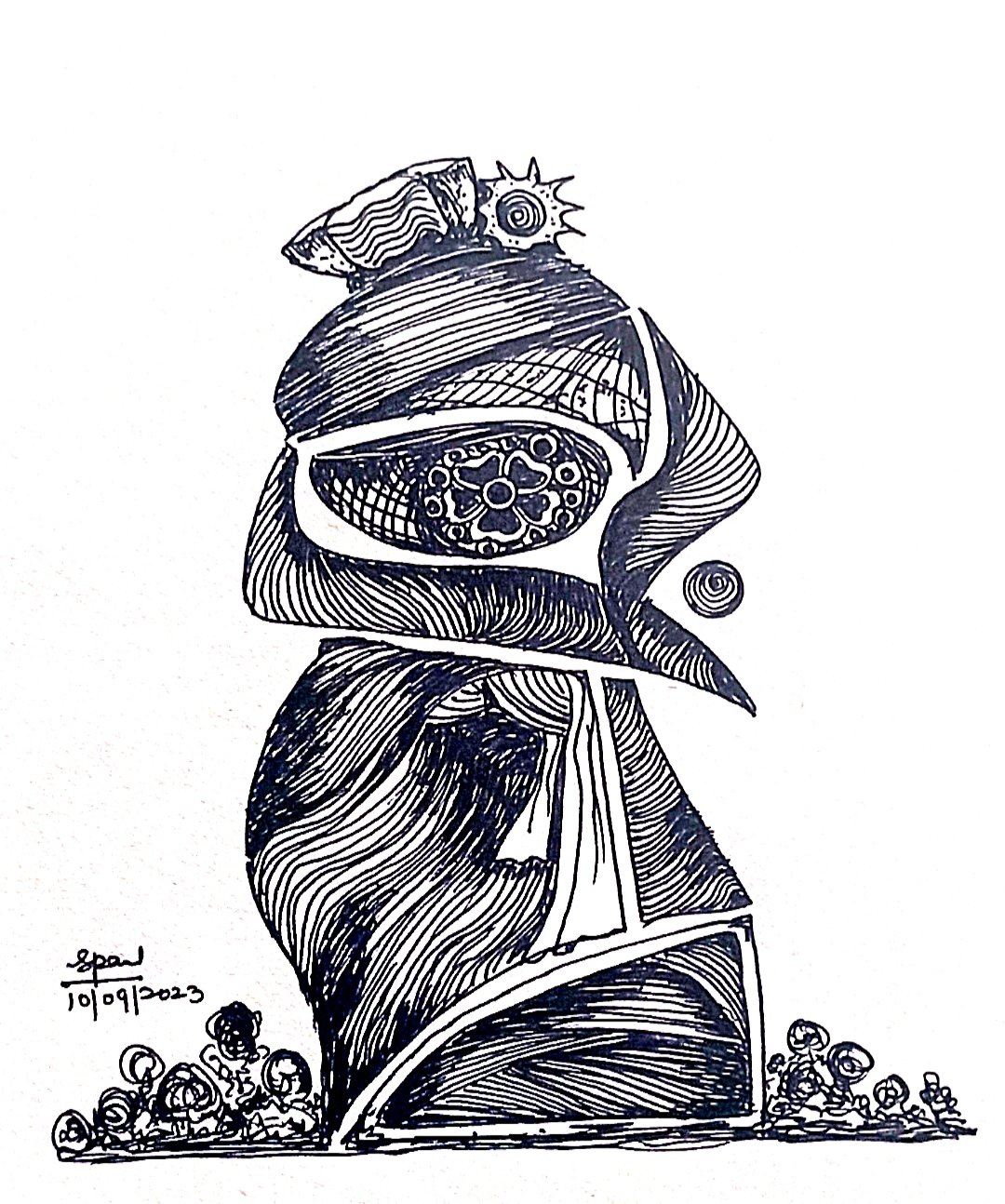
Poetry in Our Time
In this issue, 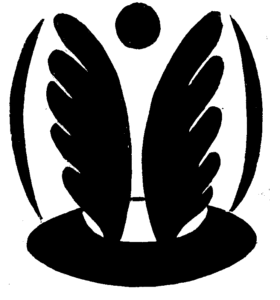 we are presenting three poets from three languages and three corners of the World. Jüri Talvet is a prominent poet from Estonia. He is broadly translated, We present his poetry in English Translation. Another poet is from Uzbekistan, Azam Abidov. He has sent us the poems written in English directly. Ratheesh Krishna is young poet, theater artist and play writer and. His Malayalam Poems have been translated in English. -RS
we are presenting three poets from three languages and three corners of the World. Jüri Talvet is a prominent poet from Estonia. He is broadly translated, We present his poetry in English Translation. Another poet is from Uzbekistan, Azam Abidov. He has sent us the poems written in English directly. Ratheesh Krishna is young poet, theater artist and play writer and. His Malayalam Poems have been translated in English. -RS
Ratheesh Krishna
She -the woman..
Writes her own body- poetry – original verse in Malayalam:
Ratheesh Krishna – translation: Nisha Narayanan
She -the woman..
Writes her own body.
She-Ignores the window,
Forgets the finger
Put in the window rails,
In the night, the sleep
Gulps down her silence.
She- dreams of the dream inside.
She writes her body.
She removes her skin,
Throws and breaks up her own flesh,
Her nerves go worming,
Plucking out The song of the night that bleeds,
She re echoes it.
Putting her ears close to its tongue
She remains sucking her own tender boobs.
Standing like a paramour at the gate,
Her sight-Gazes at its own nudity.
In a wounded bone
She scratches with her heart:
”Life like an orgasmic moment
A bliss”.
She writes her body.
Her scent, spread out each street.
Her death, hunts days.
Her nightgown streaks
Burn The town archives,
Her tears, like the last kinsman
Make scratches at the door sills.
The matted hair now
Rebirths as the dry wind
Draws its own face
In the cankered palm.
Her mystic smile’s memories
Consummates the bitter self-destruction.
She-the woman
Writes her body
From her own navalpit
She rebirths….
The Canto of Agony
poetry – original verse in malayalam : Ratheesh Krishna – translation : Ra Sh
Lord!
The city is my window to Hades.
The village is a workshop of recurring labour.
Accursed seasons and miseries exist
wherever men do.
There is no detour
except those caused by nature.
(Sympathize and lament)
I sit in a cave.
My agony turns to dust the rocks.
I wipe my tears.
The river gushes wildly.
I lie supine.
White clouds aimlessly
float around.
Every sinner is me.
All holy souls are you.
Let’s reach a compromise.
You will not find it difficult
to comply.
I set forth to join the bandits.
Or, to smuggle gold with
the Alchemists.
Or, to shepherd slaves.
I have amassed the knowledge
of many yester years
by sitting in the Academies
with ghosts.
Even the desert nights are not
so lonely in the land of the dead.
They open an ancient map
scrawled on animal hides.
The symbols that cannot be read are
decodified in verse by singing parrots.
Like the essence of nothingness
far away…. quite far away…
a spatial contour becomes discernible.
Quickly slash the horse reins.
Quickly.
The night, the storm and the snow
bite into me.
This music will make me insane.
The parrots of the Chinese utter falsehoods.
What do I do with this Persian cat
that vomits predictions?
Lord! Oh Lord!
Please lead the blind soldiers.
Please forgive the heartless poets.
Seems the Iranian police
beat to death a young girl*
for not wearing her hijab properly.
Oh rebellious young men,
please be naked on the streets.
I have nullified
the paradise after death.
Suffering-
It is a journey from now on.
No prophet believed
in his own prophesies.
I was not trained in the
traditional methodologies
to follow the symbolic interpretations
of parrots.
What do we do when war mongers are killed?
Let’s pray for the emancipation of their souls.
Offer chrysanthemums on
their mud graves.
Gods
False leaders
Heartless poets
Workers who do not know
what they are doing!
Stars and my nudeness
accompanied me
to the jungle.
I lay on the wet grass for a long time.
The fish grazed the wounds on my feet.
A donkey spewed its milk.
I whispered to let the jungle fire to go dry.
Ordered that the war be ended.
The angels sent their eagle
in quest of me.
Heavenly fairies blessed me
with flame of the woods flowers.
By the pathway stands a woman
waiting for the poet
carrying the cross.
A mob stands by to watch
the menagerie of invectives.
My striped tiger walked
up and down the hills.
Me on the tiger with
a polished double barrel gun.
Like an aimless poem.
Like the music of stubbornness that
follows no structures.
* Mahsa Amini
Banyan Ma
poetry – original verse in Malayalam: Ratheesh Krishna – translation: Veena M
Banyan, that sleeps within
The banyan seed,
Withering in sun’s heat, when approached
Need you as tender leaves of shade
To swing along on Onam days
Need your body full of root-props
Need the stories mother tells, when eating
About your body roots searching depths and returning to see the blue sky, as father tales.
Through the rotten roots
The hut trickles rain
And we woke up like
Licorice seeds, shuddering
Need your hugging branches,
Warm and scented,
Creeping roots…..
we need
A banyan leaf, we need.
As flood hits, and disaster looms
To cross the threshold little Krishna needs,
Without her knowing, to embrace
Gopika’s flute notes….
And without telling her, my love
but for assurance
Need a banyan leaf.
As your leaves
Come falling
On my shivering steps
And as my thoughts are
Cladded in tree bark
It’s not an enlightened Saint
That dwells inside a banyan seed.
Searching for her son
Cursing the demon
As pain crushes her heart
Screaming on the courtyard
Of the Sacred grove
Is a banyan tree
Wiping eyes off tears,
Hiding hands that burnt
Easing the ego that fastened me
And to call back when adieu bid
The shade and cool, is needed
Of a tender leaf
Where you stand.
Buffalo
poetry – original verse in Malayalam: Ratheesh Krishna – translation: Achuthan V Ravi
without caparison,
without sonority of orchestra*
a beast that deserves blows,
walked out of epics
buffalo tribes
buffalo gods
buffalo legends –
when mother goddesses
vigorously danced
mounting on them,
the buffalo hooves
stuck on the rocks,
and the trumpet call
that trembled
the sahya ranges,
turned to grunts.
when collapsed
between the yokes
into the furrows,
with the plough shouldered,
the buffalo turned into a
blow-deserving beast.
for the drum
a tanned skin
for a chopping knife,
a flesh
dried off milk
and fat,
for dream
two horns
of ill omen.
subaida
called the mischievous
kuttyssankara
buffalo buffalo
*here an orchestra of five types of musical instruments played during the temples festivals, called panchavādya
Ratheesh Krishna
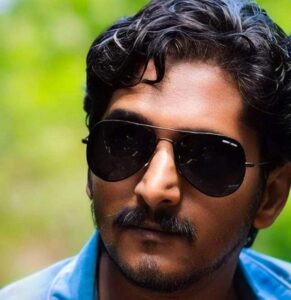
Dr. Ratheesh Krishna is an Indian poet, playwright and theatre practitioner. His poetry looks beyond the age of post-truth. His first book was published in Bengali in 2022 titled “Sāgarēra śēkaṛa tārā muṭhōẏa purēchila” (They clasped the roots of the ocean in their hands) A Collection of Malayalam Poems by Dr. Rathesh Krishna, from Santiniketan. Apart from writing poetry, he also dabbles in Theatre. Represented Indian poetry in the world poetry category at Mathrubhumi international festival of letters 2024. Participated in International literature festival of Kerala 2024. Ratheesh Krishna has directed short films, plays, and documentaries, many of which were acknowledged by Malala Yousafzai Foundation, USA, Time tunnel Festival in memory of the Beatles Band, Liverpool and Big Home Festival, Manchester, England.
Jüri Talvet
THE SWAYING TRAIN TEETERS NEARER THE BRINK
The swaying train teeters nearer the brink unwillingly
I notice in your voice that you are tense mister JT Is
there no one to stroke your hair? The salvage yard
at the border reads as a permanent installation
of group sex a symbol of the despair of an age
A cloud of seagulls obscures the sky Its explanation
is the neglected skull of a dump between snow fields
Bison never actually grazed in Buffalo though
camels with double humps and double meaning have been
abundant always on both sides of the border Heigh-ho
this high over the canyon one gasps for breath!
The camera caught far below the bristling
of the river’s broad back before Niagara breaks it
on its knee Tor-onto-onto-onto-onto-onto-onto
the train sings Nobody can pull love’s axes from
the heart’s knotted stump Between the triple time of
Strauss’s joy waltz there is room for the pain of the entire
sea voyage the blood voyage – even though for a while
your fluttering skylark’s nest cupped in the palm of my hand
objected each night with courage and frailty
PORTUGUESE WORDS TWIST
Portuguese words twist
dive into tunnels in which
the air seems to run out dark
walls force them together But
then suddenly from the seven
throats of Lisbon leaps
a tiny yellow streetcar cheerful
but with a hundred grave expressions
gazing from its windows (Just now my
tiny old mother turned at home
under her bedcovers Night why
don’t you close my eyelids?)
Fado means fate: O becomes
a U that hangs head down
But there is no deep darkness
–
instead from deep winter
Sibelius’s sad waltz sounds
Not all sadness ends in fado
Todo doesn’t exhaust totality
Before the fifth empire
there was the sixth one There too
Fernando Pessoa lived and
wrote poems but his name
was João Areia or in our
dialect Juhan Liiv
IN MARCH THE HEART SANG
More and more one meets strangers on the way,
a man in pigtails and a woman with a pageboy.
Little blue fish swim each other by.
In Baghdad bombs drop like candies from the sky –
what mágico prodigioso were they made by?
The faces of old friends fade away,
they quietly withdraw, picture-shy.
Hello, you said with a quiet sigh.
Hello, the water is clean and green here in our sea.
Little blue fish swim each other by.
I GIVE YOU A SANDWICH, MOTHER, AS
you gave one to me after you had placed
my frostbitten feet into a basin with water –
how they ached! – and gave me
a big mug of milk and a slice
of black rye bread with real country butter.
Some grey hair flew to the bread,
then a whole tuft of hair flew
toward the bread Driving them back
across the brink of the dream, I fell
into another dream, into another snow.
OH THOSE YELLOW BUTTERFLIES IN THE GARDEN
in Pärnu at the home of childhood, where summer
lasts twelve months a year!
One lighted on my palm, how bold.
We looked at it with curiosity, I, my
mother, and my little daughter – all of us
light-footed, all of the same age,
seeing with a single heart:
Look, the butterfly has a lion’s face!
HOW BEAUTIFUL THIS FLOCK OF SHEEP AT
the border between Rõngu and Elva – tiny
uniform cotton-clouds against a slightly duller
pale-yellow August afternoon sky. Men
born from women kill children, kill
themselves, sheep, always somewhere
war goes on, bombs and sheep, sheep
and bombs mixed. Already in the year
176 Celsus, brandishing The True Word,
hurried to slaughter the black lamb of the Jews.
(English translation by Jüri Talvet & H. L. Hix)
Jüri Talvet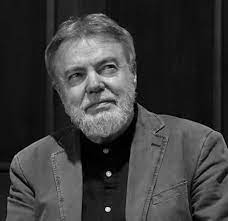
Jüri Talvet was born in Pärnu (Estonia), a graduate of the University of Tartu and a PhD by Leningrad (St. Petersburg) University, he chaired from 1992 to 2020 World / Comparative Literature program at Tartu University, where he also founded Spanish Studies. Today he is Professor Emeritus. In 2016 he was elected member of Academia Europaea. He has published in Estonia more than twenty books of poetry and essay. His books have appeared beyond Estonian in English, Spanish, French, Italian, Russian, Romanian, Serbian, Japanese, Catalan, Greek and Macedonian translations. Since 1996 he has acted as the main editor of Interlitteraria, international journal for comparative literature. He has been awarded Estonian Annual Prize of Literature for essay (1986), Juhan Liiv Prize of Poetry (1997), Ivar Ivask Memorial Prize (essay, poetry, 2002) Naji Naaman International Literature Honor Prize (for complete works, 2020), Estonian National Science Prize for Lifework (2021), Jaan Kross Literary Prize (for world poetry translations, 2022), “Golden Ivy” International Poetry Prize (Fushun, China, 2022), International Aco Karamanov Poetry Prize (North-Macedonia, 2023), etc. For further data, including his full lists of publications, see http://talvet.edicypages.com/en
Azam Abidov
LIKE a PERSIMMON
Life has become
like a persimmon:
Hard and in the color of fire
I watch
Shrouded little girls and boys
Scattered like the beads
Violence and Jealosy
Are eternal residents
On earth
I have died
A thousand times
here
A million bloody times
A dead man I am.
My ghost is
In the bomb-ruined Love Land –
The Limbo.
Life has become like a persimmon…
At the GHAZA HOSPITAL
Three Generations
A very old toothless auntieStill hopeful for her recovery
A little girl
Who could win
The world beauty contest
If she entered
A middle-aged nurse
Who has lost her hope
For ages
Fly to Abraham’s bosom
In the womb of
The unacknowledged explosion
At the Gaza hospital.
A Woman in the Cotton Field
One woman in the field –
Looks like she’s been forgotten.
Her hopes and dreams are spilled
Over dusty cotton.
The cotton’s like her hair;
She bends, then picks and speaks —
Words in the air,
Hot tears down her cheeks.
“Fifteen cents per kilo:
I’ll earn a sack of money!
Will make a lavish wedding
For my dear sonny.
Let him only come!
Or is Russia far?
Does she not stop migrant
Workers from heading home?”
Nearby,
along the road
A giant white light board
With the current president’s
Smiling, happy photo
and his election motto:
“Each and Every Person
is Our Supreme Value!”
A slow voice in her throat
Like the lamb so mild,
(The woman likes the Value!):
“Take my breathe and vote,
But bring me back my child…
Can you?”
One Woman in the Field…
I WISH I WERE GIGANTIC!
I wish I were gigantic,
Those who launch a war
Don’t tell me you are leading,
You laugh,
You watch,
Ignore,
You keep my soul bleeding.
I wish I were gigantic,
As big as Planet Earth,
I ain’t romantic,
I’m antique,
I’ve not sense of self-worth.
I let you call me villain
And stop my heavy breath.
So choak me! Then I fill in
With my body Planet Death!
I wish I were gigantic,
Comes after me Full Bliss,
I leave the world sans panic,
Sympathetic and in Peace!
I wish I were gigantic!
Azam Abidov
Azam Abidov is an Uzbek poet, translator, short story writer and activist. He is an author with more than 10 books of poetry and translation to his credit, including My Name is Uzbekistan, Tunes of Asia, Dream of Lightsome Dawns, and A Miracle Is On the Way. Azam writes in Uzbek and English, and his work has been translated into more than 20 languages. He was a Creative Writing Fellow at the University of Iowa, U.S. (2004), a writer-in-residence at LCB in Berlin (2017), as well as in Hong Kong (2024). Azam is one of the founders of the independent literary and cultural clubs at the Yudakov and Oybek House-Museums in Tashkent. In 2018, he launched the first-ever Writer/Artist Residency Program in Uzbekistan for foreign authors and artists.
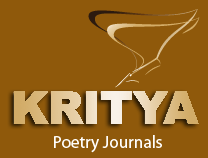

Azam
Thank you, dear Rati Saxena, for including me in this issue! Good health to you and prosperity!